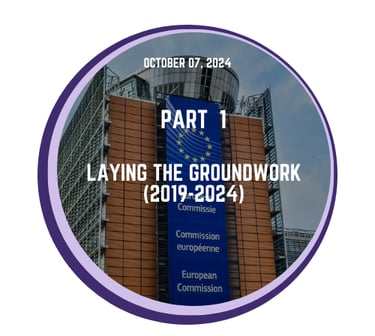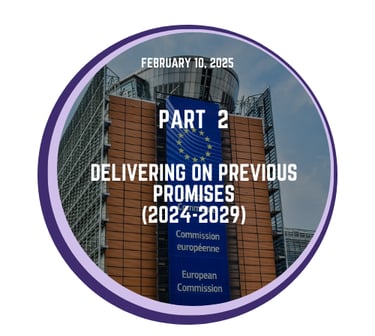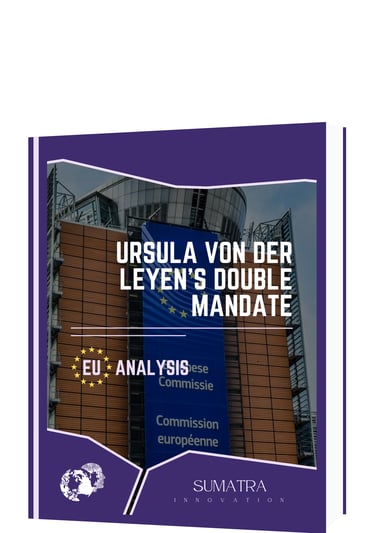Ursula von der Leyen 's double mandate




When Ursula von der Leyen (VdL) became President of the European Commission (EC) back in 2019, the economic situation was more stable than in previous years, enabling the Commission to look ahead and set targets for the coming decades. However, there were also significant challenges, such as Euroscepticism, Brexit, migration or global geopolitical tensions. Five years later, in 2024, VdL got reelected for a second term as President of the EC. Has the Commission really delivered on its promises over the past five years? How far, or how close, is the Commission to its objectives? How do the new priorities relate to the previous ones? Are they coherent or contradictory? Are they realistic or unattainable?
In order to comprehensively assess the coherence of the European Commission's strategic priorities over two consecutive mandates: “2019-2024 - A Union that strives for more” and “2024-2029 - Europe's choice”, our analysis will be divided into two sections. The aim of the first part is to analyse the work carried out during the 2019-2024 period. The first article will begin by briefly explaining the geopolitical context in 2019. Then, the six priorities of the 2019-2024 mandate will be examined separately, looking at the work done to achieve the objectives set, as well as their respective success and shortcomings. In the second part of our analysis, the new priorities for the 2024-2029 mandate will be covered. The objective is to assess the coherence of Von der Leyen’’s back to back mandates. Each of the five priorities will be discussed. The findings of the first part of our analysis will be used to assess the consistency of the two political agendas, by searching for continuities, but also contradictions and incoherences.



Executive Summary


Ursula von der Leyen began her first term in 2019 in a relatively stable economic environment, yet faced major political challenges like Brexit, rising Euroscepticism, and global tensions.
Six flagship priorities in her 2019-2024 agenda "A Union That Strives for More", aiming to modernise the EU, restore citizen trust, and address long-term global challenges.
(1) A European Green Deal : Making the EU the first climate-neutral continent by 2050.
(2) A Europe Fit for the Digital Age : Advancing digital sovereignty, AI regulation, and ethical innovation.
(3) An Economy that Works for People : Strengthening social rights, financial resilience, and SME support.
(4) A Stronger Europe in the World : Reinforcing EU global leadership, trade diplomacy, and security partnerships.
(5) Promoting Our European Way of Life : Defending the rule of law, managing migration, and enhancing public safety.
(6) A New Push for European Democracy : Revitalising democratic participation and combating disinformation.
Over 370 legislative files adopted, with notable progress on climate, but facing challenges in areas like migration solidarity, social reforms, and tax harmonisation remain significant.
The first von der Leyen Commission laid a highly ambitious legislative foundation, but uneven implementation across Member States, complex negotiations, and geopolitical disruptions often slowed or limited progress. The next mandate will need to focus on delivering tangible results and securing political cohesion.
Re-elected in July 2024, Ursula von der Leyen begins her second term in a politically tense and fragmented landscape, marked by global conflicts, rising authoritarianism, and a rightward shift in the European Parliament.
The seven priorities of the 2024–2029 agenda build on the previous term, but shifts toward policy delivery, geopolitical resilience, and internal reform, under the guiding motto: “Invest Europe”.
(1) A Prosperous, Competitive and Sustainable Europe : Deepening the Single Market, reducing regulatory barriers, empowering consumers, and building a Clean Industrial Deal.
(2) A European Homemade Defence and Security : Advancing a Defence Union, improving cybersecurity, and reinforcing internal security with a focus on Frontex and the Pact on Migration.
(3) A Better European Way of Life for the People : Addressing poverty, social inequality, youth participation, and affordable housing.
(4) A Better European Quality of Life : Boosting sustainable agriculture, ensuring water and food security, and preparing for climate impacts.
(5) Protecting Democracy and European Values : Combatting disinformation, upholding the rule of law, supporting civil society and free media.
(6) Europe’s Global Leadership: Power through Partnership : Strengthening EU’s role in global governance, foreign policy, enlargement, and sustainable trade.
(7) A New Budget and Reforms for a Better Future : Advocating for a more flexible EU budget, institutional reform, and deeper integration of the Single Market.
Despite ambitious proposals, major obstacles include limited funding capacity, growing Euroscepticism, institutional fragmentation, and geopolitical shocks, requiring strategic trade-offs between security, climate, and social policies.
The success of von der Leyen’s second term will hinge on her ability to shift from legislative ambition to tangible impact, uniting Member States around shared investments, defending EU values, and strengthening Europe’s role in an increasingly volatile world.






